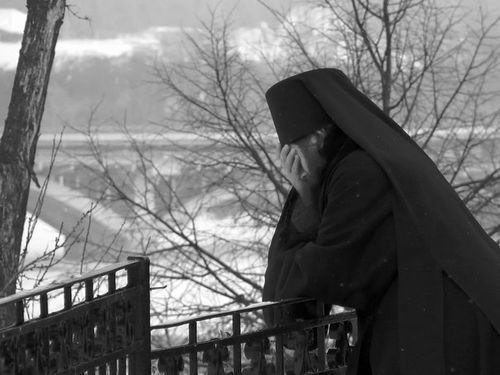Fr. Vladimir Zalipsy, a priest in Tallinn who served in Estonia during the Soviet era, once addressed his parishioners with a sermon that explains many of our misunderstandings, calling us to look upon our sins not only during the period of Great Lent. Here follow excerpts from this address:
Christ says in the Gospel: “If ye continue in My word, then are ye My disciples indeed; And ye shall know the truth, and the truth shall make you free” (John 8:31-32)…
“If you continue in My word”… If you continue… I will stop at these words, because I thought: how difficult it is to continue in Christ’s words. Or I’ll put it more correctly, more precisely: how few people there are who continue in Christ’s words. It’s not so much that it’s difficult, but namely that so few people continue in Christ’s words.
In ancient times, the Church was called the Church of the saints. And fairly soon after this ancient period, the Church began to be called the Church of the penitents. And this, of course, is already much lower. Lower, but this was the case. It became the Church of the penitents – not of saints, but of sinners. After all, sinners need to repent. And once one does not continue in Christ’s words – if people sin and do not guard and fulfill Christ’s words – then only one thing is left: repentance. One needs to humble oneself and repent. And, as one ancient Father and ascetic of the Church said: if you live like this – sinning, adding sin to sin, not keeping God’s commandments, and not just not keeping them, but constantly violating them, stewing in this sinful cauldron, in this unclean mess, and not leaving it behind (although you could if you tried, but you don’t) – then only one thing is left to you: to endure what comes your way.
This shows that I don’t know myself. One believes in Christ, and believes sincerely – there is reverence and the fear of God – but one is still overcome by sinful pride, the desire to make oneself more pleasant. Sin in pleasant; it has its pleasure; and one yields to this pleasure. And one finds oneself, as it were, between two chairs: one wants to go both this way and that; one wavers. One wants to hold on to this, and to keep that – but also to be with Christ. One doesn’t renounce Christ, but one does indulge oneself, and pets oneself, cherishing one’s passions and lusts… Then the Lord allows such a person to endure something unpleasant, and sometimes something very unpleasant – so unpleasant that it can cause one to murmur in discontent, bitterness, and even exasperation, which is dangerous.
Why is this so? Because when one is under the influence of sin, one goes blind and deaf, and begins to hate everything. It seems that one is being dealt with unfairly, that things aren’t the way they’re supposed to be – although everything’s fine. But still, little by little… But it seems to one that it’s all wrong, that one doesn’t deserve one’s sufferings… Anticipating all this, and anticipating the dangers of such a state, the monastic Fathers of the ancient Church tell us all that, if you act this way, only one thing is left to do: endure without murmuring, without cursing; become reconciled to it, suffer the hardships. Endure what comes your way.
This can strike anyone. It can be very small, or very large; it can be obvious, or it can be secret. It can be physical or spiritual, from people or owing to circumstances, or from illness… Well, illness is the most common. But it can also be from people, it can be deserved: reproach, shame, and reproof – anything can happen. It can be deservedly so… I deserved it. And I don’t want to, it’s unpleasant: here one begins to protest and to “kick” against the person and make excuses. Here is what this saint says, bequeaths, and advises: don’t “kick” against it. May God grant that you not “kick,” and especially that because of this you don’t fight and make excuses. Silently endure for God’s sake – endure what comes your way.
Indeed, this is a great thing: to humble oneself, to accept what is as well-deserved – that’s what humility is all about. It’s not saying that I’m such-and-such, going about with some special look – no, be like everyone else. Only say in your heart: this must be what’s needed. Even if I don’t understand why it’s so, if I don’t see any reason for it in me – but, Lord, it’s clearly no accident… This is a great thing for us, who are sinful people – to accept things, to be thus attuned, to bear such a thought in oneself: I’ll accept it; I’ll tolerate it. Then all suffering will turn into great benefit. Then one comes to God through this patience and help, feeling relief, and one begins to see within clearly, to understand why and how things happen. Then ease will come, and one will even give thanks sincerely – not forcedly, not just because one has to – and one will be grateful for everything, according to the words of the Apostle Paul: “Rejoice evermore. Pray without ceasing. In every thing give thanks: for this is the will of God in Christ Jesus concerning you” (1 Thessalonians 5:16-18) – one will be grateful for all things, and even rejoice!
That’s what’s important: in sorrows there shall be joy. Sorrows themselves will be a source of joy – but a special, spiritual joy. It is special, but it is great and it is true and real, not dreamlike, not imaginary, but completely natural joy. And it will embrace the whole person: one will rejoice and give thanks to those that reproach one, that persecute one, that bully one. One will give thanks to them and bless them, because they’ll have become the cause of enlightenment, peace, and joy coming forth from Christ. The Apostle says: “For as the sufferings of Christ abound in us, so our consolation also aboundeth by Christ” (2 Corinthians 1:5): that is, to the extent that we suffer for Christ, Christ increases our consolation.
And if a sinner, a great sinner, will do this, remembering Christ and His commandments, humbling himself in all things and bearing trials – then all this will be accounted to him as martyrdom. He will undergo a spiritual rebirth, a renewal, a resurrection of the soul; he will be reborn.
You see, brothers and sisters: everything that happens to us on earth is done with great wisdom. And everything, from beginning to end, is salutary for us – if only we accept it properly. And accepting it properly is very simple: Glory to God! Of course, that is easier said then done – that goes without saying. It’s simple, but difficult. But it is salutary and remains achievable.
Of course, we need a constant inward memory of who I am and what I am, of what I have done… May God grant that we not lose faith in Christ, trust in Him, prayer, the reading of Holy Scripture, attending church, frequent Confession, frequent Communion – this is spiritual strength that regenerates us, because Christ acts in all of this. We chant: “Christ is my strength,” and so He is. This is the strength of Christ; this is surrender to God’s will; it is the confession of the Wise Thief: “Lord, remember me in Thy Kingdom.” Lord, grant us, for Christ’s sake, this salutary patience. And if thanksgiving is added to it – then it’s all very good!
Of course, I’m not talking about the most cheerful things, but they’re necessary…
But, in general, the end was joyful and cheerful: “at evening shall weeping find lodging, but in the morning rejoicing” (Psalm 29:6) – it’s better that way, rather than vice versa: an evening of cheer and joy, followed by a morning of weeping. Better for the end to be good, than the other way around. The end crowns the work. Christ is Risen!
In continuing to acquaint the reader with this remarkable priest, let us mention that Fr. Vladimir did not take his theological courses in seminary – he was expelled from the Leningrad Theological Seminary for protesting against the secularization of seminary life, with its obligatory “cultural campaign,” concerts, and visits to all kinds of celebrations. A delegation made up of three students went to Vladyka Gregory (Chukov), telling him of the protest among the seminaries, among whom was Vladimir Zalipsky. Vladyka Gregory took the side of the seminarians, even trying to remove the archpriest who was the main “cultural worker,” but the latter had strong protectors, who tried to expel the “troublemakers.”
Thus, the theological course of the future priest took place at the “Kommunar” shoe factory in Tallinn where, as a safety engineer, he spent six years in his office, reading spiritual literature and copying out texts from the Holy Fathers. His wife, Natalia Nikolaevna, recalls what Fr. Vladimir said about his life in the “Kommunar”: “When he returned to Estonia, he spent a year unable to work because his documents were from the camp and from seminary, where he studied and from which he was expelled. Neither one was acceptable. Yet he managed to get a job in the shop of the ‘Kommunar’ shoe factory. There he copied out all the lives of saints, Abba Dorotheos, Ephraim the Syrian, and Sts. Barsanuphius and John. There were quite a lot of excerpts from St. John of Kronstadt’s My Life in Christ. The factory workers couldn’t understand why he was copying all this out…”
In some of his talks, Fr. Vladimir gratefully remembered his boss, who was an unbeliever, but regarded his subordinate’s occupation sympathetically and did not interfere with it. Only he could not understand what this “Christian love” thing was…
I think that many people who turned to Fr. Vladimir and received consolation and instruction from him can now say that they know what Christian love is.
Translated from the Russian


















